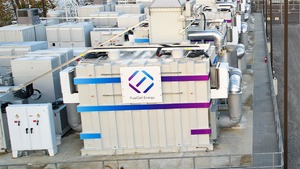
New research from the World Resources Institute finds that each $1 investment in climate adaptation can yield more than $10.50 in returns over 10 years, reflecting not only the avoided losses from climate impacts but also a wide range of economic, social and environmental benefits that are generated even when disasters don’t occur.
In a new paper, Strengthening the Investment Case for Climate Adaptation, WRI analyzed investments in 320 adaptation and resilience projects spanning agriculture, water, health and infrastructure. These ranged from upgrading food storage facilities in Bangladesh to improving water management in Brazil.
The investments represented over $133 billion in value and are expected to generate $1.4 trillion in benefits over 10 years. Individual investments were estimated to generate an impressive average return of 27%, WRI found.
“Extreme weather events like floods and droughts are becoming more frequent and intense around the globe, disrupting communities and the infrastructure they rely on. In 2024 alone, the world endured 58 disasters that wreaked over a billion dollars in damages each,” Carter Brandon, Bradley Kratzer, Aarushi Aggarwal, Harald Heubaum and Celine Novenario wrote in a post on the WRI website reporting the research findings.
“Yet finance to cope with and respond to these impacts falls persistently short: The gap between funding needed to adapt to climate change and what is currently available is as high as $359 billion per year,” they said.
They explained that part of the reason for the disconnect is that adaptation measures, such as strengthening early warning systems or making infrastructure more resilient, are seen in traditional financing only as a way to avoid potential losses and not as a broader investment opportunity.
But using a “triple dividend of resilience” framework, researchers showed that climate adaptation investments can generate higher rates of return than is commonly thought. They provided this example:
“Consider an urban infrastructure project in Vietnam that aims to reduce flooding and improve water drainage. When estimating the return on this project, many models would consider only the avoided cost of flood damage. But investments in resilient infrastructure could also increase average land prices, decrease health care costs by reducing waterborne diseases and boost workers’ productivity by reducing travel time, thanks to new and improved roads. The triple dividend framework would account for all these outcomes, offering a more complete picture of the value that adaptation and resilience projects can bring.”
Among other highlights from the research:
- Health: Adaptation investments in the health sector offer some of the highest returns, averaging over 78%. This is because investing in more resilient health systems can save lives, improve public health and bolster economic productivity, especially among vulnerable populations.
- Disaster risk management: Investments in disaster risk management also deliver high returns — nearly 36% on average — by safeguarding lives and infrastructure while minimizing economic disruption. This is particularly true of cost-effective tools like early warning systems.
- Sustainable agriculture and forestry: Adaptation returns in the agriculture and forestry sector average over 29%, largely driven by developmental gains like higher yields and productivity, as well as environmental benefits.
- Resilient infrastructure: Projects focused on resilient energy, cities and transport systems offer wide-ranging benefits, with an average return on investment of close to 30%.
- Water: Water-related projects saw 19% returns on average, although that number does not fully capture the range of benefits from investing in the water sector, which are often difficult to measure and quantify, researchers said.
“Looking at the full picture puts adaptation in a new light. Our research challenges the mindset that adaptation is a financial burden, pulling limited funds from other priorities. It proves that it is often much more profitable to adapt than not to do so — and that good adaptation is, in fact, good development,” the authors concluded.
Read more: Only 5% of companies have a biodiversity strategy







